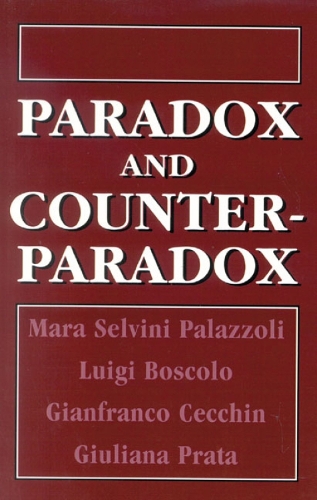
Paradox and Counterparadox: A New Model in the Therapy of the Family in Schizophrenic Transaction
(Paperback)
Publishing Details
Paradox and Counterparadox: A New Model in the Therapy of the Family in Schizophrenic Transaction
By (Author) Mara Selvini Palazzoli
By (author) Luigi Boscolo
Jason Aronson Publishers
Jason Aronson Publishers
1st August 1994
United States
Classifications
General
Non Fiction
Psychiatry
Sociology: family, kinship and relationships
616.89156
Physical Properties
Paperback
202
Width 144mm, Height 187mm, Spine 16mm
268g
Description
Paradox and Counterparadox introduces the English-speaking public to the first results of a research plan drawn up my the Milan Center for Family Studies at the end of 1971 and put into practice at the beginning of 1972. The book reports the therapeutic work carried out by the authors with fifteen families, five with children presenting serious psychotic disturbances, and ten with young adults diagnosed as schizophrenics in acute phase. Though accepting the Bleulerian term schizophrenia, by now in general use, the authors have used it to indicate not the sickness of an individualDas in the traditional medical modelDbut a peculiar pattern of communication inseparable from the other patterns of communication observable in the natural group (in this case, the family) in which it manifests itself. Starting from the position that modern sciences concerned with communication emphasize the central role of paradox as the source of paralyzing disturbances as well as of creative transformations, the authors demonstrate that it is possible to intervene in a family in schizophrenic transaction by devising original and paradoxical methods in order to release the action-pattern from disturbance to transformation. The counterparadoxes generated in this process, illustrated through a great number of examples, are rigorously analyzed in accordance with the conceptual models provided by general systems theory, by cybernetics, and by the pragmatics of human communication. The reader will recognize, in the cases presented, the stimulating originality and efficacy of this approach, one whose interest exceeds the purely clinical and which offers new points of departure for an ecologic vision of human relationships. A Jason Aronson Book
Reviews
This book will make the brilliant work of Mara Selvini Palazzoli and her gifted team more widely known in this country. The internal consistency of their approachcombining a systemic theory of family with a systemic theory of changeresults in a therapy that is elegant, powerful, and economic. Using their knowledge of families as natural, rule-governed systems, the team proposes a hypothesis to explain the function of a problem in the family. They then base an interventionparadoxical or otherwiseupon this hypothesis. The intervention serves to validate (or disprove) the hypothesis and to suggest further moves. The moves themselves are astoundingly compact. Palazzoli and her team are masters of the art of co-opting the resistance. They use the forces deployed by the family against change to produce change. It is as if one were to use the rules of Alice's Looking-Glass Kingdom to break the looking-glass. After the solemnity which surrounds the practice of the therapeutic art in this country, it is refreshing to find a practice which relies upon drama, wit, surprise, and (of course!) paradox. This is a book which should not only be acted upon but read. -- Lynn Hoffman, A.C.S.W., Ackerman Institute of Family Therapy
This volume is a treasure chest of new and interesting ideas. The most luminous jewel in the collection is a paradigm, a new epistemology that takes seriously the revolutionary perspectives on human behavior introduced by Gregory Bateson, Watzlawick, Jackson, Haley, and others...Mara Selvini Palazzoli and her Milanese colleagues have labored with courage and humility and have provided us with a book of stellar magnitude. -- Donald A. Bloch, M.D.
